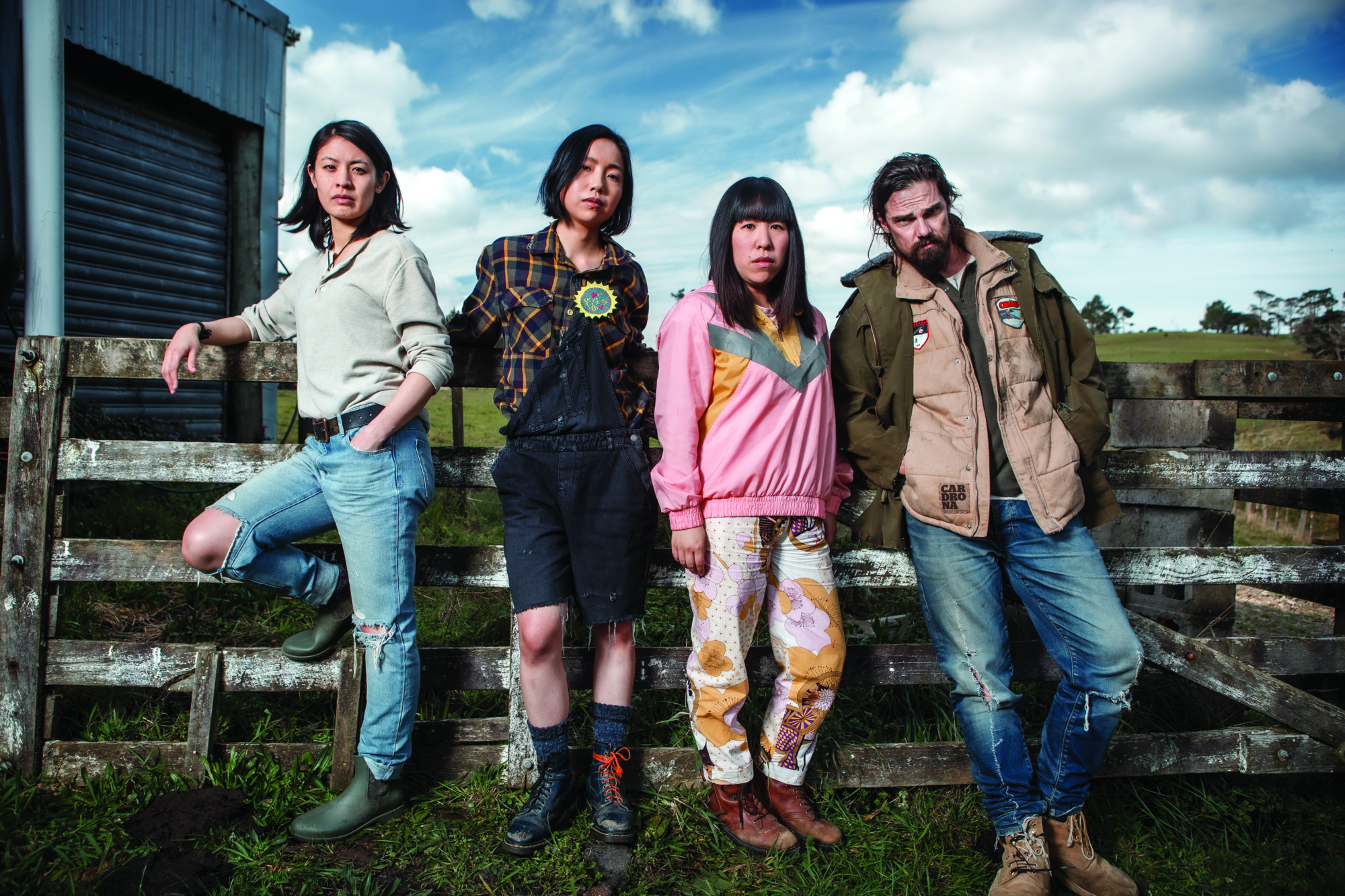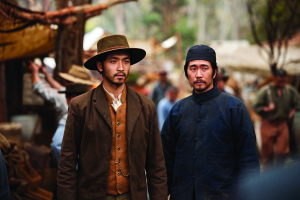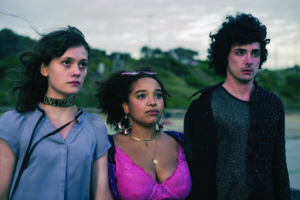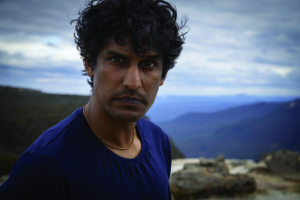It’s inevitable that, in a time of pandemic, themes of disease and social disruption will begin to show up in popular culture. Our art, after all, reflects the preoccupations of the time in which it is created, and so it is that our screens have been redolent with notes of isolation, anxiety and illness over the past two years. COVID-19 is, of course, the elephant in the room – even if we try to talk around it, it’s impossible to ignore it.
The six-part New Zealand television production Creamerie seems to be a pretty obvious case in point. Created by Chinese-Kiwi comedy team JJ Fong, Perlina Lau, Ally Xue and Roseanne Liang (who also serves as director), the series takes place in a hypothetical near future some eight years after a deadly virus has apparently killed every single human with a Y chromosome. In the wake of losing almost half the population, society has transformed, with an organisation called Wellness rising to a position of almost total political and social power dressed in the language and trappings of the health and wellness movement.
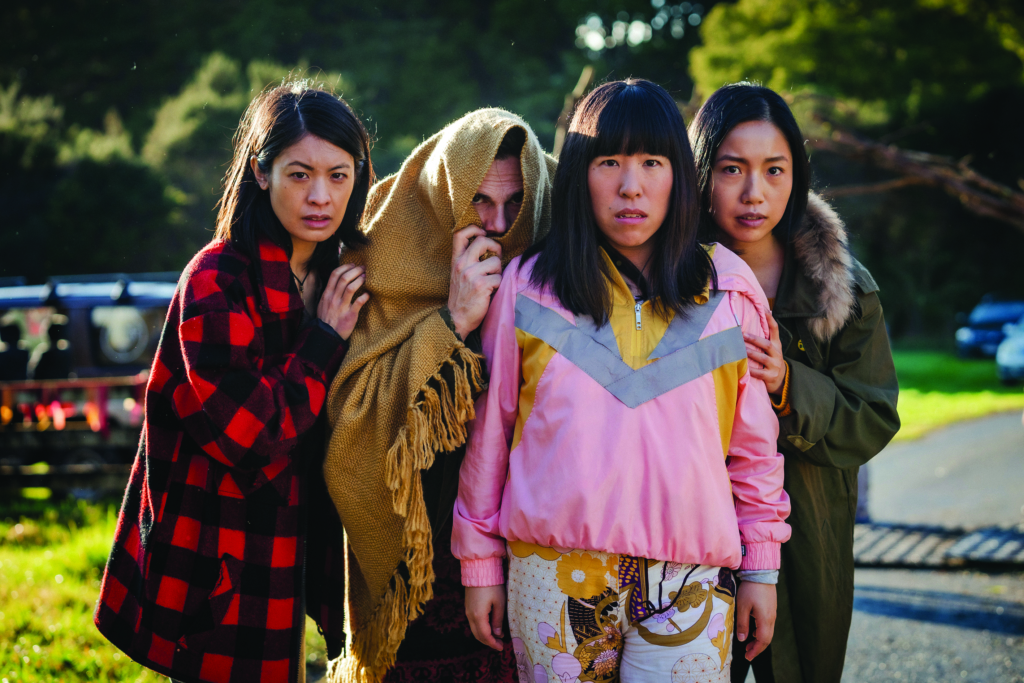
The show’s specific setting is a small organic dairy farm in the fictional Hiro Valley, Jackson’s Creamerie, which is run by three women. Jaime (Fong) lost both her husband (Yoson An) and infant son to the mysterious virus, and wants nothing more than to be a mother again. Her only chance is to be selected in the ‘sperm lottery’, the method through which Wellness is distributing the last, dwindling supplies of stored pre-plague sperm in order to repopulate the world. There is, of course, a 50 per cent chance of miscarriage: male babies cannot be brought to term.
Jaime’s friend, Pip (Lau), is a socially awkward people-pleaser who has almost completely bought into this new world order of wellness and woo. Indeed, she works for Wellness, and is desperate to climb the corporate ladder by impressing her superior, Lane (Tandi Wright), a kind of cross between Goop-era Gwyneth Paltrow[1]See Amanda Mull, ‘I Gooped Myself’, The Atlantic, 26 August 2019, <https://www.theatlantic.com/health/archive/2019/08/what-goop-really-sells-women/596773/>, accessed 15 November 2021. and Nineteen Eighty-Four’s Big Brother.
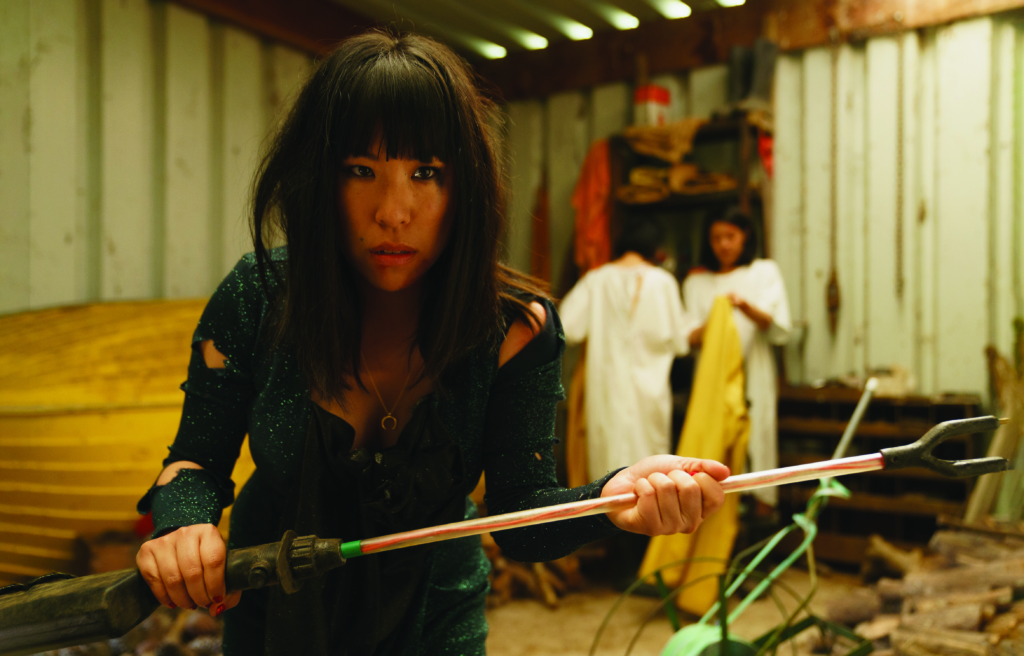
Finally, there is Jaime’s sister-in-law, Alex (Ally Xue), who is deeply distrustful of the whole Wellness regime and frequently acts out against the new social norms. In the first episode, she throws a spinach-and-flaxseed smoothie at Lane during a public address, earning her a period of Bliss: a chemically delivered state of artificial euphoria in which the subject is too calmly ecstatic to be a disruption. Alex, ever rebellious, is having a clandestine affair with Constance (Nikki Si’ulepa), the local cop charged with keeping her in line. Alex wears her iconoclasm proudly, but too many transgressions will result in a lobotomy – permanent Bliss.
The narrative’s inciting incident comes when the hapless Pip accidentally hits a man with her car. Bearded, hunky Bobby (Jay Ryan) is on the run, and tells them that there are other male survivors of the plague who are being tracked down by the Hunter (Sara Wiseman), a sort of gender-specific skip tracer. For the three main protagonists, the sudden appearance of a living man offers different but compelling possibilities. For Jaime, the appeal is his virility: he could allow her to conceive a child without going through the bureaucracy of the sperm lottery. For Pip, turning him in to the authorities will be an opportunity to curry favour with Lane and bolster her position at Wellness. And for Alex, his very existence, plus his assertion that there are other men out there, is proof that something is rotten in the state of Wellness, and that her mistrust of and disdain for the post-pandemic order is well founded.
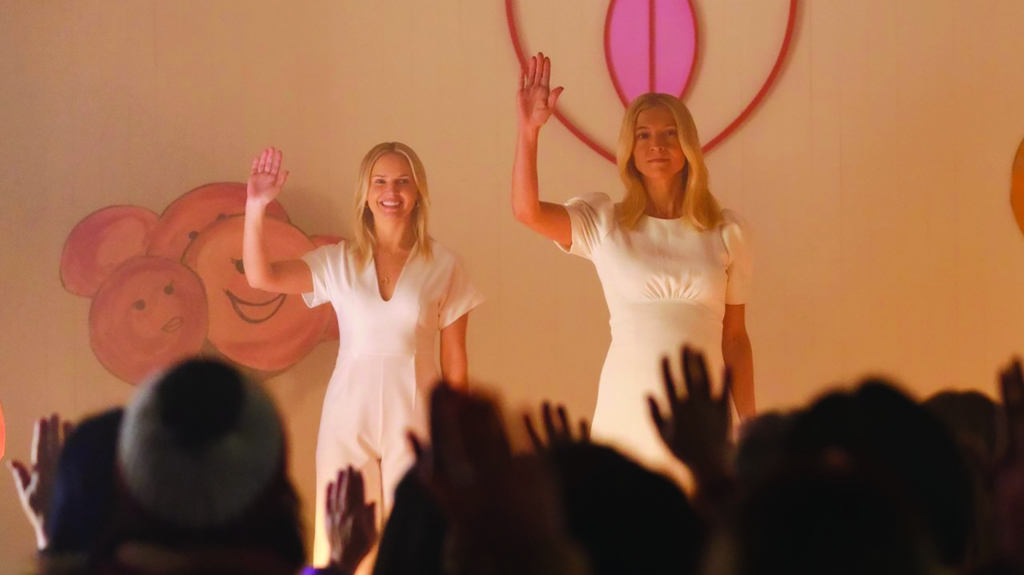
Creamerie is a comedy, but a very dark one, trucking in dystopian and apocalyptic imagery and language. The opening montage sequence, mapping the onset of the virus, begins with a muscular, shirtless man coughing blood in a sportsground changing room and ends with a pile of dead male bodies being burned, all set to the strains of an all-female children’s choir singing Louis Armstrong’s ‘What a Wonderful World’. The emotional toll of the pandemic is not downplayed: Jaime is clearly deeply traumatised by the loss of her husband and son. But the real humour – and, increasingly, as the series progresses, horror – comes from its satirical jabs at wellness culture, and particularly at how the language and tropes of wellness, concern, health and abundance can be used as tools of control and suppression. There are elements of the Newspeak of George Orwell’s Nineteen Eighty-Four in the way that catchphrases and different names for things have been codified into everyday conversation. People curse by exclaiming ‘Goddess!’, and at one point a frustrated Pip declares, ‘If at first you don’t succeed, robustly dialogue the merits of trying again.’ Later in the series, we are witness to a ‘menstrual festival’ reminiscent of an agricultural show, with a Ferris wheel renamed a ‘cycle’ and a mascot called Moonie dressed up as a giant foam menstrual cup, while gift bags are handed out with the phrase ‘There’s an “us” in every uterus.’
The post-pandemic Wellness world purports to be a utopia – and, by both situation and design, a feminine one, with menstruation leave now universal and weekly mandated orgasms for all – but it is clear that anyone who steps out of line is looking at the harshest of punishments, all delivered with a benevolent smile. There’s an element not just of cultishness but of religious fundamentalism; the choir of girls in the first episode, dressed in their spick-and-spartan formal best, look like nothing so much as the congregation of some conservative church in the American Midwest. Ultimately, it’s all authoritarianism dressed up as compassion, with those who toe the line embraced and those who buck the system ruthlessly quashed, pinned with the seemingly benign but chilling label of ‘civic negativity’.
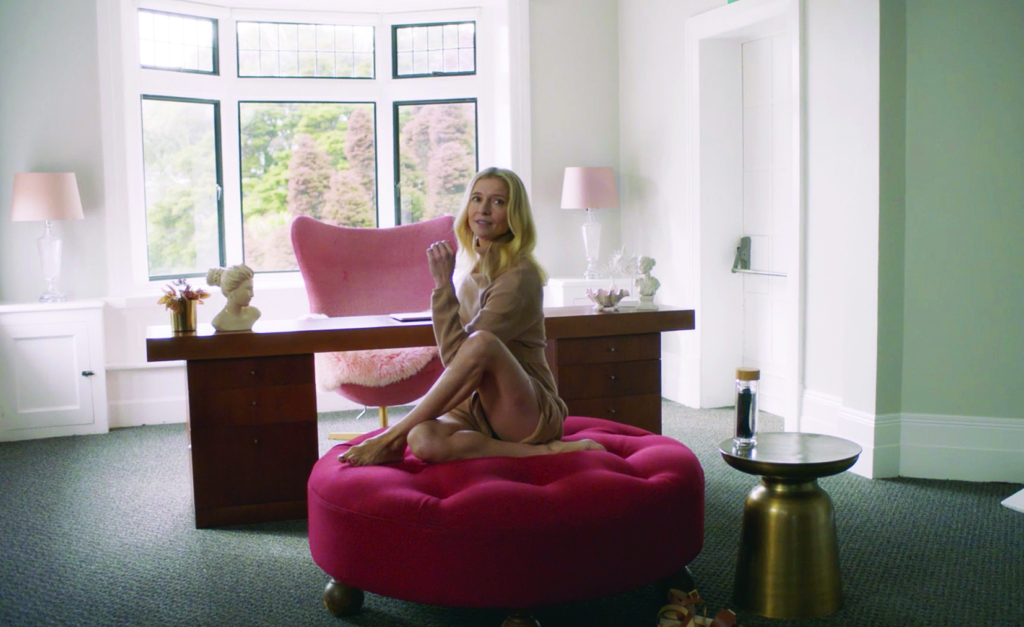
There are plenty of antecedents to Creamerie, few of them comedic. Nineteen Eighty-Four is there, and so too is Aldous Huxley’s Brave New World, particularly in the way mood-altering drugs are used as a form of control. More recently, there’s Brian K Vaughan and Pia Guerra’s comic book series Y: The Last Man, which also deals with an event that has obliterated the entire cis male population bar the titular Yorick Brown (played by Ben Schnetzer in the aborted 2021 TV series of the same name), who – like Bobby in Creamerie – finds himself a valuable prize in a world inhabited almost exclusively by women.[2]In the Y: The Last Man comic strip, unlike in Creamerie, transgender men are specifically mentioned to have survived the event; the TV adaptation expands on this by including a major trans male character, Sam (Elliot Fletcher). See Keegan Prosser, ‘Y: The Last Man Boss Wants to Reshape Our Understanding of Gender’, CBR, 18 September 2021, <https://www.cbr.com/y-last-man-eliza-clark-understanding-of-gender/>, accessed 15 November 2021.
But the most obvious text of comparison is The Handmaid’s Tale – both the novel by Margaret Atwood and its subsequent screen adaptations (the 1990 film directed by Volker Schlöndorff and the ongoing 2017 television series created by Bruce Miller). Both The Handmaid’s Tale and Creamerie deal with a scenario in which fertility is in crisis: in Creamerie, it’s due to the virus that wiped out all (well, most) men; and in The Handmaid’s Tale, it’s a broad drop in fertility rates due to a number of interlinked reasons. And while the strict religious totalitarianism found in the Republic of Gilead and the ostensibly benign Wellness regime of Creamerie’s post-pandemic New Zealand are tonally poles apart, both have given rise to a society rooted in biological essentialism, in which one’s function and status are directly linked to one’s ability to participate in procreation.
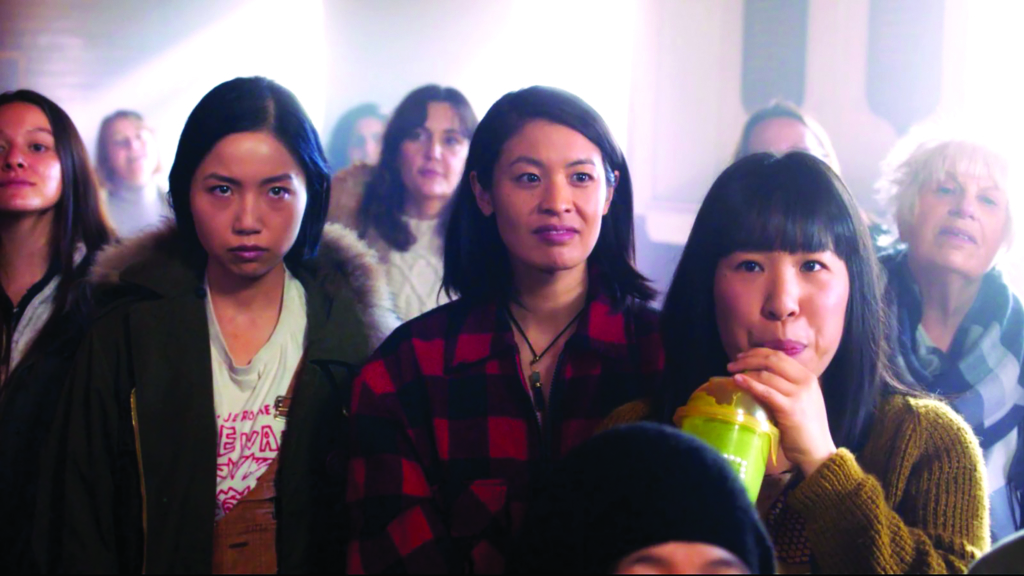
This is the core theme of Creamerie, and it permeates every element of the series: the ways in which authority enforces conformity, and how the roles we are expected to perform are frequently at odds with our own desires. Characters are judged by their ability to fulfil the function Wellness selects for them, and are punished for rebellion: Alex risks lobotomy for even her seemingly low-key acting out; Pip cleaves to the doctrine and dogma of Wellness, seeking a sense of identity and a path of advancement; and Jaime seeks to reclaim the child she loved and lost by participating in the sperm lottery, having been told by local medico Doc Harvey (Rachel House) that she has a ‘perfect vulva’ for childbearing. Later, having been rejected for insemination, Jaime bemoans her lot, comparing it to that of the nineteen cows on Jackson’s Creamerie. ‘Do you know what happens to cows that aren’t milking or pregnant?’ she asks a concerned Pip. ‘I shoot them!’ In this world, a creature unable to fulfil its designated function is surplus to requirements. Far from being just a bit of bucolic New Zealand whimsy, the dairy-farm setting thus works to underline and reinforce Creamerie’s central themes.
The big twist is that Bobby is also now reduced from the status of an individual to a walking biological function. Like the handmaids of Atwood’s dystopia, the surviving men of Creamerie are being used as breeding bulls by the upper echelons of the Wellness regime, sentenced to life in a prison called The Facility where they are to be milked of their semen as part of the organisation’s plans for world domination. We can add Ursula K Le Guin’s 1973 short story ‘The Ones Who Walk Away from Omelas’ to the list of Creamerie’s antecedents: Le Guin’s tale concerns a seemingly utopian city whose prosperity depends on the perpetual torture of a single child; ‘the ones who walk away’ are the citizens who leave upon learning this truth. In Creamerie, the emotional culmination of this thread is a rather horrific rape scene at a banquet hosted by Lane, where a number of women pin Bobby down and attempt to mount him – a scene reminiscent of the woman-on-man rape that forms the core of Greek-Australian director Ana Kokkinos’ 2006 film The Book of Revelation.
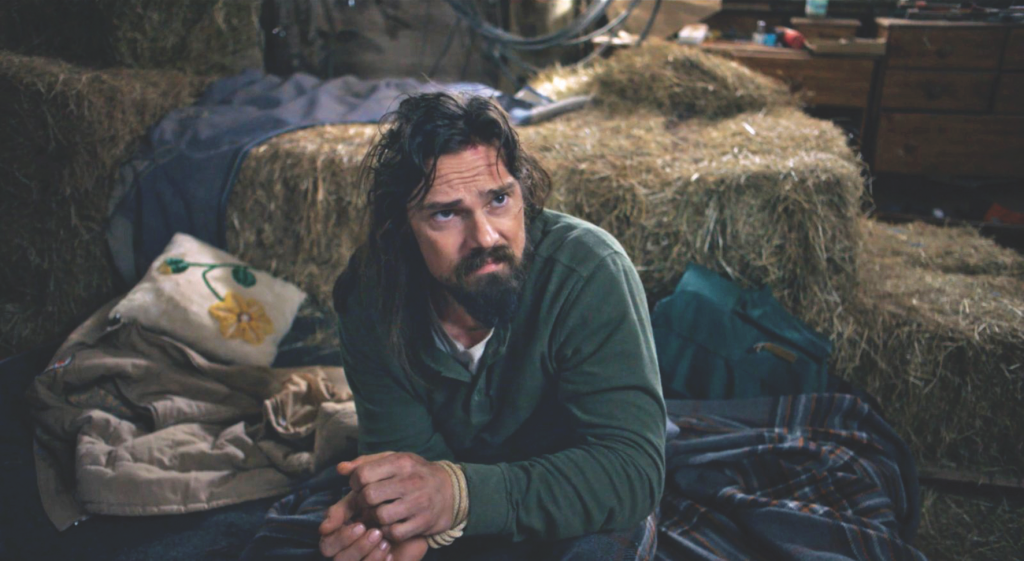
For all its health-related platitudes, the key plank of the Wellness regime is gender essentialism – you are who your chromosomes say you are. Interestingly, there are seemingly no transgender people in Creamerie’s six half-hour episodes; perhaps their absence speaks to Wellness’ off-screen attitudes towards trans men (or anyone who defies the gender binary). The blurring of gender lines becomes a signifier of rebellion in Creamerie: it is surely no accident that the names of the show’s three protagonists are fairly androgynous; and while it is out of necessity that Bobby is dressed in women’s clothes while being nursed back to health at Jackson’s Creamerie, it serves as a clear visual cue that he is fighting to not be defined by his gender-mandated function.
This first season of Creamerie ends with the revelation that Jaime’s husband, the eponymous Jackson of Jackson’s Creamerie, is not only not dead, but the architect of The Facility: the dairy farmer has become a people farmer. It’s a perfect end-of-season cliffhanger, although it does rob us of a climax, sacrificing a final-act thesis statement for the promise of more drama to come. Hopefully the need to extend the storyline won’t rob Creamerie of its thematic strength – this is a sharp, wry, dystopian comedy with a lot to say about our bodies, our lives and who controls them.
Endnotes
| 1 | See Amanda Mull, ‘I Gooped Myself’, The Atlantic, 26 August 2019, <https://www.theatlantic.com/health/archive/2019/08/what-goop-really-sells-women/596773/>, accessed 15 November 2021. |
|---|---|
| 2 | In the Y: The Last Man comic strip, unlike in Creamerie, transgender men are specifically mentioned to have survived the event; the TV adaptation expands on this by including a major trans male character, Sam (Elliot Fletcher). See Keegan Prosser, ‘Y: The Last Man Boss Wants to Reshape Our Understanding of Gender’, CBR, 18 September 2021, <https://www.cbr.com/y-last-man-eliza-clark-understanding-of-gender/>, accessed 15 November 2021. |
